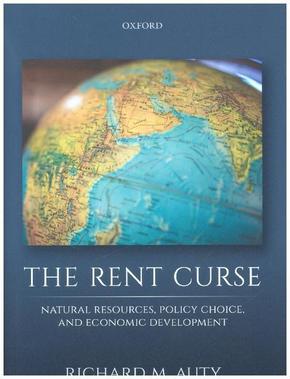
The Rent Curse - Natural Resources, Policy Choice, and Economic Development
| Verlag | Oxford University Press |
| Auflage | 2018 |
| Seiten | 276 |
| Format | 15,6 x 24,2 x 2,1 cm |
| Print PDF | |
| Gewicht | 596 g |
| Artikeltyp | Englisches Buch |
| ISBN-10 | 0198828861 |
| EAN | 9780198828860 |
| Bestell-Nr | 19882886EA |
This book compares models of low-rent and high-rent development to explain the divergent growth of regions and to query the continued prioritization of industrialization over agriculture and export services as the engine of economic prosperity.
The resource curse is a variant of a wider rent curse that can also be driven by geopolitical rent, regulatory rent, and labour rent. Total rent can therefore be from one-tenth to two-fifths of GDP and sometimes more. Rent is detached from the activity that generates it and is up for grabs so it feeds contents for its capture and its deployment can radically impact the development trajectory for better or worse, all too often for worse.
The Rent Curse: Natural Resources, Policy Choice, and Economic Development studies two rent driven models to suggest that low rent incentivizes the elite to grow the economy efficiently, whereas high rent encourages rent siphoning for immediate enrichment at the expense of long-term growth. It looks at low rent Mauritius and high rent Trinidad and Tobago to show that low rent stimulates rapid and relatively egalitarian economic growth with incremental democratization, whereas high rent inhibits competitive diversification and frequently caus es protracted growth collapses. The post-war prioritization of industry has proved a double edged sword.
The Rent Curse employs rent driven models to explain why low rent East Asia has closed the income gap with advanced economies; why rent rich Latin America may be de-industrializing; why agricultural neglect launched sub-Saharan Africa on a false start to economic development; why South Asia pioneers growth through export services; and why governmenets in the oil-rich Gulf states raised the incomes of nationals without conferring the skills to sustain them.
Inhaltsverzeichnis:
Part I: Context
1: Aims, approach, and structure of the study
2: Natural resources, country size and development: A review of the literature
Part II: Emergence of rent-dependent development
3: The rent-seeking legacy of the plantation economy in Trinidad and Tobago
4: The staple trap in high-rent Trinidad and Tobago
5: Low-rent Mauritius as a development counterfactual for high-rent Trinidad and Tobago
Part III: Differential rent-driven development in global regions
6: Agricultural neglect and retarded structural change in Sub-Saharan Africa
7: The evolving role of manufacturing in economic development
8: Prospective growth impacts of export services
Part IV: Analysing the role of rent in economic development
9: The principal findings and some policy implications
Rezension:
Auty and Furlonge offer a more nuanced and extended treatment of the reliance on rents beyond the typical case of natural resources. Adam D. Dixon, Maastricht University, Eurasian Geography and Economics
